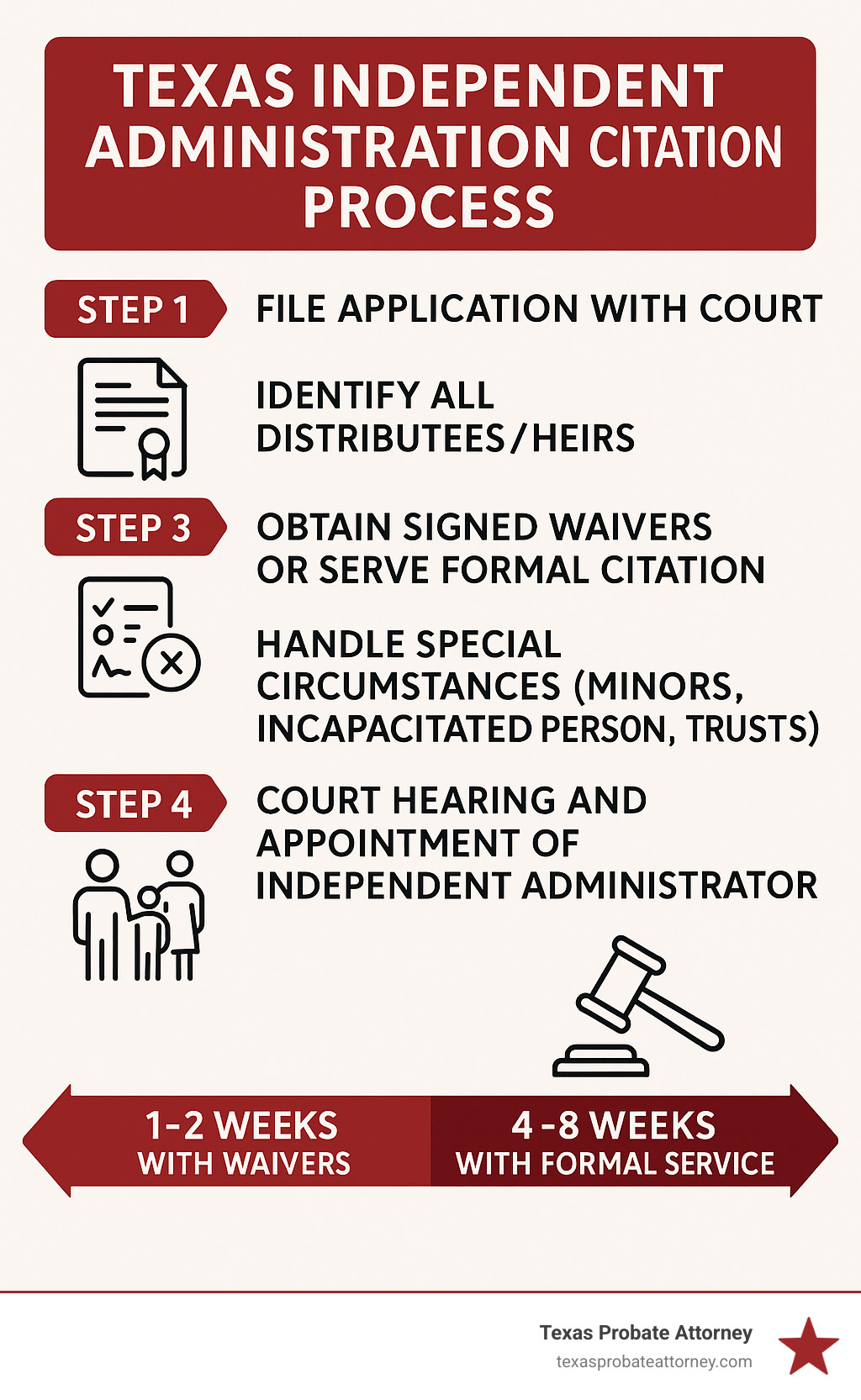Texas Probate Citations—What You Need for Independent Administration
Understanding Citation Requirements for Texas Independent Administration
When dealing with a citation application for independent administration texas, you’re looking at a crucial legal notice process that must be completed before a court in Houston, Fort Worth, or Austin can appoint an independent administrator for an estate. Here’s what you need to know for filing in these specific locations:
Key Citation Requirements for Harris, Tarrant, and Travis Counties:
- All distributees (heirs/beneficiaries) must receive formal notice OR sign a waiver.
- Citation must be issued by the county clerk in Harris, Tarrant, or Travis County.
- Service requirements vary based on whether distributees consent or must be formally served by a local process server or sheriff.
- Special rules apply for incapacitated persons, minors, and trust beneficiaries, which are strictly enforced by the probate courts in these counties.
- Timeline varies from days (with waivers) to weeks (with formal service).
If you’re navigating probate in Houston, Fort Worth, or Austin, the citation process determines whether your independent administration moves forward smoothly or gets delayed by local procedural requirements.
The citation serves two critical purposes: it provides legal notice to all interested parties about the probate proceeding, and it gives them an opportunity to object or contest the appointment. Without proper citation or valid waivers, the probate courts in Houston, Fort Worth, and Austin cannot proceed with granting independent administration.
Think of citation as the legal equivalent of announcing “we’re settling this estate” to everyone who has a stake in it. The good news? In our experience with families in the Houston, Austin, and Fort Worth areas, most are willing to sign waivers to speed up the process when they understand it saves time and money.
The complexity comes when dealing with special circumstances—like when a distributee is a minor, incapacitated, or when family members disagree. Texas Estates Code Section 401.004 provides specific rules for these situations, and the probate courts in Harris, Tarrant, and Travis counties require careful adherence to these legal requirements.

Learn more about citation application for independent administration texas:
- duties of independent administrator texas
- independent administration texas estates code
- what is an independent administrator in texas
- Probate overview on Wikipedia
What is a Texas Independent Administration?
In Texas, an independent administration is a streamlined way to settle a deceased person’s estate. It allows a personal representative—an executor from a will or a court-appointed administrator—to manage property and debts with minimal court supervision. This hands-off approach is popular in the probate courts of Harris County (Houston), Tarrant County (Fort Worth), and Travis County (Austin) because it avoids the constant court approvals required in a “dependent administration,” where nearly every action needs a judge’s permission.
The Goal: A Simpler Probate Process
The purpose of independent administration is to make probate smoother and quicker. Once appointed by a court in Houston, Fort Worth, or Austin, the independent administrator has broad power to act without asking for permission at every step. This means they can collect assets, pay estate debts, manage property, and distribute the remaining assets to the correct heirs or beneficiaries as directed by the will or Texas law. This freedom from constant court oversight saves the estate money on legal costs and significantly speeds up the process, which is a great relief for grieving families we serve in Houston, Fort Worth, and Austin. For more details, you can learn what is an independent administrator in Texas.
When is Independent Administration a Good Choice?
Independent administration is established in two main ways under Texas law, both of which are common filings in Houston, Fort Worth, and Austin courts:
- When the Will Says So: The easiest path is when a will specifically requests an independent administration. If the will names an executor and asks for this, the court in Harris, Tarrant, or Travis County typically just needs to approve the will and receive an inventory of assets.
- When All Heirs Agree: If there is no will, or the will doesn’t mention it, all heirs or beneficiaries can unanimously agree to an independent administration. This is where the citation application for independent administration texas process is critical, as every interested person must be formally notified or provide written consent to the court.
Independent administration is an excellent choice for estates in the Austin, Houston, and Fort Worth areas when:
- A will specifically requests it.
- All heirs or beneficiaries are in complete agreement.
- There are no major family disagreements or expected challenges.
- A trustworthy person is available to serve as administrator.
However, it may not be suitable if the estate has significant debt or if a will contest is likely, as such disputes can become particularly prolonged and costly in the high-volume probate courts of Houston, Fort Worth, and Austin.
The Critical Role of Citation in the Application for Independent Administration Texas
In Texas probate, “citation” is a fundamental requirement, not a mere formality. It ensures that everyone with a legal interest in an estate is properly informed about the proceedings. For any citation application for independent administration texas, understanding this legal notice is essential for the probate courts in Harris County (Houston), Tarrant County (Fort Worth), and Travis County (Austin) to grant an administration.

A citation is a formal document issued by the county clerk—for example, the Harris County Clerk’s office for a Houston probate—that serves as a legal notice to all “interested persons,” such as heirs, beneficiaries, spouses, and creditors. Its purpose is to officially notify them that an application for independent administration has been filed. This notice informs them of their rights, gives them an opportunity to contest the application, and is a jurisdictional requirement for the court to proceed.
The Two Paths: Serving Citation vs. Obtaining a Waiver
When handling citations for a probate case in Houston, Fort Worth, or Austin, there are two options:
- Serving Citation: This is the formal delivery of the citation to each interested party, usually by a process server or sheriff in the relevant county. If an heir’s location is unknown, the court may require citation by publication in a local newspaper (e.g., the Fort Worth Star-Telegram). This formal process can be time-consuming and costly.
- Obtaining a Waiver of Citation: This is the faster, preferred method. A waiver is a signed legal document where an heir or distributee agrees to forgo formal service of the citation. By signing, they acknowledge the proceeding and consent to it moving forward without further notice. This streamlines the process, saving time and money for estates in our service areas.
At Texas Probate Attorney, we aim for the smoothest process for our clients in Houston, Fort Worth, and Austin. We prioritize obtaining waivers from all parties to avoid delays. However, if an heir refuses to sign a waiver, formal service becomes necessary.
A Step-by-Step Guide to Handling Citations for Independent Administration
Navigating the citation application for independent administration texas process can seem complex, but it follows a clear path in the probate courts of Houston, Fort Worth, and Austin.

Step 1: Initiating the Administration
The first step is determining how to start the independent administration, which depends on whether there is a will.
- With a Will (Testate Estate): If the will requests an independent administration and names an executor, the process in Harris, Tarrant, or Travis County is straightforward. If the will is silent on this, an independent administration can still be created if all beneficiaries agree.
- Without a Will (Intestate Estate): If there is no will, all legal heirs must unanimously agree to an independent administration and on who should serve as the administrator. A crucial part of this process is a Determination of Heirship proceeding, where the court legally identifies all the heirs. This proceeding is a prerequisite in the probate courts of Houston, Fort Worth, and Austin before an independent administrator can be appointed in an intestate estate.
Step 2: Filing the Application and Managing the Citation Application for Independent Administration Texas
Next, the official paperwork is filed with the appropriate probate court in Harris County (Houston), Tarrant County (Fort Worth), or Travis County (Austin).
- File the Application: An “Application for Independent Administration” is filed, providing details about the decedent and a list of all known heirs.
- Issue or Waive Citation: After filing, you either ask the county clerk to issue citations for formal service or, ideally, you file signed “Waiver of Citation” forms from all heirs. These waivers state that the heirs agree to the administration and consent to the appointment of the proposed administrator, which significantly speeds up the process in these busy courts.
Step 3: Navigating Special Circumstances with Citations
Some situations require special handling to ensure all interests are protected, and the courts in Houston, Fort Worth, and Austin are particularly diligent in these cases.
- Incapacitated Persons or Minors: An heir who is a minor or is otherwise legally incapacitated cannot sign a waiver. In these cases, a legal guardian can provide consent. If there is no guardian, the court will appoint a guardian ad litem—an attorney from a court-approved list in that county to represent the best interests of the minor or incapacitated person.
- Trusts as Distributees: If a trust is a beneficiary, the trustee can often provide consent on behalf of the trust beneficiaries, under specific rules outlined in the Texas Estates Code.
- Life Estates as Distributees: A person with a “life estate” (the right to use property for their lifetime) is considered the distributee for consent purposes.
These rules, found in Texas Estates Code § 401.004, highlight why experienced guidance is valuable. Our team at Texas Probate Attorney understands these nuances, ensuring your application meets all legal requirements in Houston, Fort Worth, or Austin. You can also read more about the general duties of independent administrator Texas on our site.
Powers of an Independent Administrator and When to Be Cautious
Once appointed by a probate court in Houston, Fort Worth, or Austin, an independent administrator holds significant power. The Texas Estates Code allows them to manage and settle the estate with minimal court supervision. However, this authority comes with great responsibility, and independent administration is not always the best choice for every estate in these areas.

Broad Powers Granted by the Court
An independent administrator appointed in Harris, Tarrant, or Travis County can perform most actions without court approval, including:
- Managing and collecting all estate assets.
- Notifying creditors, evaluating claims, and paying valid estate debts.
- Selling estate property, including real estate in the Houston, Fort Worth, or Austin markets, to pay debts or expenses.
- Distributing the remaining assets to the beneficiaries or heirs.
- Closing the estate once all tasks are complete.
Throughout this process, the administrator has a high fiduciary duty to act honestly and in the best interest of the estate and its beneficiaries. A breach of this duty can lead to legal action in the county probate court where the administration is pending.
When to Avoid Independent Administration
Despite its benefits, independent administration should be approached with caution in certain situations, particularly in the complex legal environments of Houston, Fort Worth, and Austin:
- Significant Family Conflict: If heirs are in disagreement or a will contest is likely, the lack of court supervision can worsen disputes, leading to costly litigation in the busy dockets of Harris, Tarrant, and Travis counties.
- Concerns About the Administrator: If heirs do not trust the nominated administrator’s ability to manage the estate responsibly, a court-supervised dependent administration may offer more protection, a common consideration for judges in these metropolitan probate courts.
- Complex Debt Issues: For estates with heavy or disputed debts, the oversight of a dependent administration can be beneficial, especially when dealing with local creditors in the Austin, Houston, or Fort Worth areas.
- Vulnerable Heirs: If a probate judge in Houston, Fort Worth, or Austin believes independent administration is not in the best interest of a minor or incapacitated heir, they will deny the application to ensure greater protection.
Frequently Asked Questions about Texas Probate Citations
Here are answers to common questions about the citation application for independent administration texas and its impact on estates in Houston, Fort Worth, and Austin.
What happens if an heir refuses to sign a waiver of citation?
If an heir or distributee refuses to sign a waiver for a case in Harris, Tarrant, or Travis County, they must be formally served with the citation. This means a process server or sheriff in that specific county will personally deliver the legal notice to them. While this ensures they receive proper notice of the probate proceeding, it adds time and cost to the process. It is always faster and less expensive when all parties agree to waive service.
Can an independent administrator be appointed without a bond?
Yes, an independent administrator in Houston, Fort Worth, or Austin can often serve without a bond, which is an insurance policy to protect the estate. This typically happens in two scenarios:
- The Will Waives Bond: If the decedent’s will specifically states that no bond is required, courts in Harris, Tarrant, and Travis counties usually honor this request.
- All Heirs Agree: If there is no will or the will is silent on the matter, all distributees can agree to waive the bond requirement, often in the same document where they consent to the independent administration.
While courts generally grant these requests, a judge in Houston, Fort Worth, or Austin can still require a bond if they believe it is necessary to protect the interests of the estate, creditors, or vulnerable heirs.
How long does the citation process take in Texas?
The timeline for the citation process in Houston, Fort Worth, and Austin varies significantly:
- With Waivers: If all heirs sign waivers, the case can proceed to a court hearing very quickly, often within a few weeks of filing the application in Harris, Tarrant, or Travis County. This is the most efficient path.
- With Formal Service: If an heir must be formally served, the process will take longer. It can add several weeks to locate the individual, complete service through a local process server in the Houston, Austin, or Fort Worth areas, and wait for the mandatory period before the court can proceed.
- With Publication: In the rare case that an heir is unknown or cannot be found, the court may order citation by publication in a newspaper of general circulation within the county (e.g., the Houston Chronicle in Harris County). This is the slowest method, as it involves a mandatory waiting period after publication.
Navigating Your Probate Case in Texas
Whew! We’ve covered a lot about independent administration and the critical role of the citation application for independent administration texas. It truly is a foundational step, almost like setting the stage for the entire probate process that follows. Getting it right from the start can make all the difference.
Think of it this way: handling that initial notice correctly in the courts across Houston, Fort Worth, and Austin is key to open uping all the benefits of independent administration—like saving time and money. On the flip side, a misstep here, whether it’s an error in serving notice in Travis County or a hiccup with obtaining waivers from heirs in Fort Worth, can unfortunately lead to frustrating delays and even legal challenges down the road. Nobody wants that, especially when you’re already dealing with a loss.
That’s where we come in. At Texas Probate Attorney, our team is here to offer dedicated, personal representation for cases in Houston, Fort Worth, and Austin. We’ll guide you through all these procedural requirements, making sure everything is handled smoothly and correctly. You don’t have to steer these waters alone.
For a helping hand with your probate matter and to find how we can simplify the journey for you, we invite you to learn more about our independent administration services. We’re ready to help you move forward with confidence.

